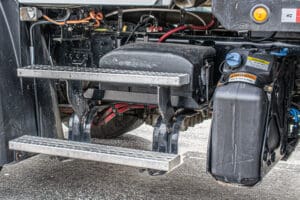All new diesel vehicles, including trucks, manufactured after 2010 are programmed to inject Diesel Exhaust Fluid (DEF) into their exhaust systems. This change was implemented for all diesel vehicles, whether commercially or privately owned. Many engines have also been adapted to shut down or reduce performance when DEF is not found in the system. What is DEF, why is it required, and do you have best practices in place for maintaining DEF for fuel efficiency in your fleet of vehicles or equipment?
 What is DEF?
What is DEF?
DEF is a non-toxic solution that helps reduce harmful emissions from diesel engines, particularly nitrogen oxides. DEF is a high-purity solution composed of 32.5% urea and 67.5% de-ionized water. It is stored in a dedicated tank in the vehicle and is sprayed into the exhaust system. When injected into the exhaust stream, DEF breaks down the nitrogen oxides into harmless nitrogen and water, making it an essential component for reducing air pollution. This process is facilitated by a selective catalytic reduction (SCR) system, which has become a standard feature in most diesel vehicles.
What is its effect on efficiency?
DEF stands out for its remarkable ability to optimize your vehicle’s fuel efficiency. With its blend of urea and de-ionized water, DEF boasts elevated oxygen levels that contribute to not just purer nitrogen and water emissions but also enhance the combustion process, resulting in reduced fuel consumption for your truck. The sophisticated SCR system, employed by most trucks, is ingeniously designed to ensure the engine operates efficiently while emitting cleaner substances. Remarkably, certain truck manufacturers assert that the utilization of DEF can lead to an impressive up to 5% increase in fuel mileage while achieving greater power. The efficiency of an SCR engine that uses DEF allows you to worry less about engine maintenance now and in the future. Since the engine runs so efficiently, there’s less wear and tear on engine components reducing the likelihood of repairs and extending the life expectancy of your vehicle’s engine.
Why is DEF required?
Diesel Exhaust Fluid (DEF) is a legal requirement for medium- and heavy-duty vehicles with diesel engines produced after 2010. Diesel vehicles constructed after this date are programmed with DEF injection systems. If a diesel truck runs out of Diesel Exhaust Fluid (DEF), it can lead to reduced engine performance and, in some cases, the vehicle may enter a “limp” mode, which limits speed and power. When the DEF tank runs dry, the engine’s power is often reduced, and the vehicle’s speed may be limited until the DEF tank is refilled. Ignoring the warning signs and continuing to operate the vehicle without DEF can result in potential damage to the engine and may lead to costly repairs. Therefore, it is essential to monitor the DEF levels and refill the tank promptly to ensure the proper functioning of the vehicle and compliance with emission regulations. Additionally, the American Petroleum Institute (API) offers a certification program for DEF, and licensing fees are required for marketers to certify their products against industry-recognized standards. All of this is in place because of its positive effects on our environment. DEF significantly reduces gas emissions that lead to air pollution, allowing compliance with stringent emission standards. When combined with the exhaust stream from a diesel vehicle, DEF breaks down emissions, transforming them into harmless nitrogen and water, thus reducing harmful nitrogen oxides (NOx) and particulate matter emissions. This process not only helps in meeting stringent emission standards but also contributes to improving air quality and public health. Additionally, DEF is a non-toxic, non-hazardous, and non-flammable fluid, and it has a natural pH of 9.0, making it environmentally safe. The use of DEF is recommended for all diesel vehicles to reduce emissions and promote healthier air quality, and it is a legal requirement for medium- and heavy-duty vehicles with diesel engines produced after 2010. Therefore, the environmental impact of using DEF is substantial, as it effectively reduces harmful emissions and contributes to a cleaner and healthier environment.
Guidelines for maintaining DEF for fuel efficiency
It’s important to maintain the DEF levels in your diesel fleet to ensure they are operating efficiently. As noted above, low or non-existent levels of the fluid will reduce the vehicle’s power and speed. Implementing guidelines for maintaining DEF for fuel efficiency and compliance is important for your business. These procedures should include checking for low DEF fluid indicator lights as part of your regular vehicle inspection checklist. Also, drivers should be made aware of the need to refill the DEF tank and keep proper records of it. The DEF tank in a diesel truck needs to be refilled once for every 3 to 4 times that the truck is refueled with diesel fuel. The frequency of DEF refilling may vary based on operating conditions, driving habits, and the size and usage of the vehicle. Typically, the consumption rate of DEF is around 2-3% relative to the amount of fuel burned, meaning that for every 50 gallons of diesel fuel consumed, approximately 1 gallon of DEF is used. Therefore, the refilling frequency is tied to the vehicle’s fuel efficiency and the amount of fuel burned.
Learn how H&S Energy Group can help your business operate more profitably.
Contact our experts at H&S Energy Group to help analyze your business and introduce you to strategies to increase your revenues and profitability. We work with business owners to review business practices, evaluate methods for improving operational performance, and implement programs to boost bottom-line profitability. We can help you search for the right location, select between branded or unbranded fuel, build your business brand, diversify your product line, select ancillary services to boost your bottom line, and so much more. By partnering with H&S Energy Group, we can help your business unlock its potential with new opportunities and achieve unimaginable success. Contact us today to get started.



